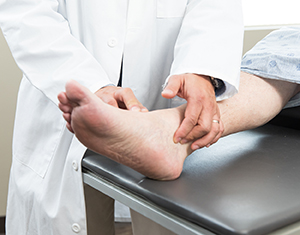Diabetes: Treating Severe Foot Infections
Diabetes: Treating Severe Foot Infections

Get treatment
In some cases, infections can spread through the feet and up the leg. To treat a severe infection, you may be hospitalized and given intravenous (IV) antibiotics. You may also be referred to healthcare providers who specialize in treating infections. If the infection is a serious risk to your health, surgery may be recommended.
The goals of surgery
The goal of surgery is to remove the infection and protect your foot or leg. Some surgeries remove a small amount of dead tissue from the infected area. In some cases, toes or larger amounts of tissue may be removed. Surgery may be done in a hospital or wound care facility. The length of your stay depends on the surgery and how well you’re healing. During recovery, you will likely need to limit activity for a while. You may also have visits from a home healthcare nurse. Be sure to see your healthcare provider for follow-up appointments.
Wound care
Suggestions include the following:
Regular wound care after surgery helps keep your foot free of infection and aids healing.
Change your dressing every 6 hours, or as directed by your healthcare provider.
You may need IV (intravenous) antibiotics to help control the infection. Other medicines may be used to help your foot heal more quickly.
Do what you can to keep your blood sugar within your target range. This will also help wound healing.
A home care nurse may shorten your hospital stay by helping with your dressings or IV antibiotics at home.
If needed, your healthcare provider may refer you to a wound care facility. These are medical facilities that specialize in treating ulcers and infections that are hard to heal. While you’re there, you may work with several kinds of healthcare providers. You may also be given antibiotics or other medicines that help fight infection. Part of your treatment also includes learning to care for the wound at home.
You may be told to keep your foot elevated as much as possible. You may also be told to avoid putting weight on the foot.
Updated:
February 22, 2018
Sources:
Clinical Manifestations, Diagnosis, and Management of Diabetic Infections of the Lower Extremities. UpToDate
Reviewed By:
Brown, Kim, APRN,Hurd, Robert, MD,Image reviewed by StayWell art team.